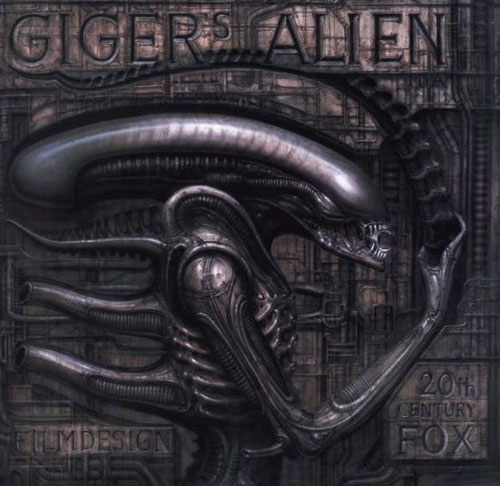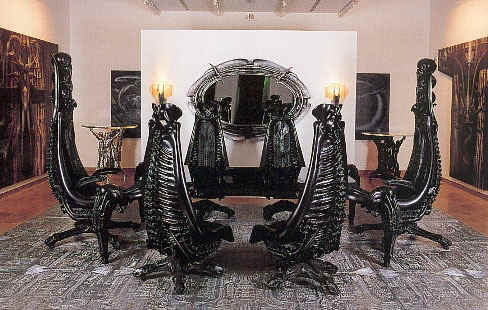In Which I Once Again Ramble At Potentially Thread-Killing Length:
• There’s a difference between bad adaptations and movies that aren’t really what you want them to be. The late Gene Siskel used to complain that his colleague Roger Ebert had a tendency to review “the film he wished it was” instead of the film it actually is. To that end: to say that Alien is a bad film because it abbreviated Geiger’s original vision is, in my opinion, a narrow view. Same with the Bourne pictures. They may not be the movie that Geiger and Ludlum fans wish they were, but they are awfully good movies, taken on their own terms. Further, I think one could make the argument that the films in question probably did more to enhance the popularity of both artists. To say, for example, that Geiger suffered because of the (first two) Alien films is, I think, a disingenuous point of view. Safe to say that pretty much everyone who knows and appreciates H.R. Geiger does so because of those movies. And if people discovered the masterful control of Mr. Ludlum because they like that cute Matt Damon, so be it. The world wins, in my opinion.
• Re the above: Someone once asked Stephen King about the near-universal crap that characterized the adaptations of his early work. The interviewer asked if all the bad movies didn’t somehow destroy his novels. He turned around to look at his bookshelf, where the first editions of his novels sat, and said something to the effect of, “Nope. They’re all still right there.” (He may have been citing Raymond Chandler, who might have been the first guy to point this out.) I’m just saying.
• I spent a long time agreeing with King that Kubrick’s “The Shining” was a bad adaptation – that Kubrick spent so much time trying to transcend the genre, he lost sight of what made the genre exciting. These days, oder and wiser, I can watch the film without literary preconception – and damn if the guy didn’t make an interesting picture. He did pretty much the same thing to “2001”, a very good but workmanlike novel that achieved some odd kind of greatness on film.
• Whoever cited “Russia House” as a bad adaptation, well done! I get bored just remembering that movie. It must have taken real work to make Le Carre dull.
• Lolita is a great example of the un-filmable novel. Film is just too literal a medium to capture all that’s great about that book. At some point, both adaptations boiled down to the catastrophically simplistic theme of “Hot Young Girl vs. Seedy Old Man”. Of the two iterations, I (obviously) admire Kubrick’s more, but still, they both kind of suck. As for Adrian Lynne’s version, Jesus. Frankly, I’d just as soon watch an 11 hour documentary of Jeremy Irons reading the book than sit through either 2 hr. film again.
• No Country For Old Men (mentioned upthread) is an interesting case. On first viewing, I thought that the last 45 minutes worked better as prose than as a motion picture. Proved what I always thought about adaptations – what was an amazing and philosophically rigorous denouement in prose seemed like a cop out in the movie. Second time I watched it, though, I understood that I was wrong.
Tired now.
![]() What is the point of him? Anything like Con-Air?
What is the point of him? Anything like Con-Air?


